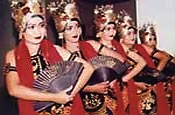The government of Banyuwangi gives special attention to the art of Gandrung. The purpose of this is to encourage the spirit of local ethnicity that will in turn increase the development of tourism. For this reason, Gandrung was determined to be the mascot of tourism in Banyuwangi according to the Banyuwangi Regency Decision, Number 173 in 2002.
 The word “Gandrung” comes from the Javanese word that
means “desperately in love”. It means that they are
in love with the goddess of the rice paddy, Dewi Sri, that brings
prosperity to the people of Banyuwangi who are mostly employed as
farmers. In gratitude for the good harvest, the people organize
a performance which is called “Gandrung” because the
farmers were in love with the goddess of the rice paddy.
The word “Gandrung” comes from the Javanese word that
means “desperately in love”. It means that they are
in love with the goddess of the rice paddy, Dewi Sri, that brings
prosperity to the people of Banyuwangi who are mostly employed as
farmers. In gratitude for the good harvest, the people organize
a performance which is called “Gandrung” because the
farmers were in love with the goddess of the rice paddy.
The Gandrung performance used to be performed at night, running
from 09 PM until 04 AM. This traditional art is performed during
the day as well to especially welcome distinguished guests.
Gandrung dance that dominated with special orchestration is one of traditional art in Banyuwangi and become the characteristic symbol of Banyuwangi. So, in every event Banyuwangi always has similarity name with Gandrung. In fact, Banyuwangi is often called Gandrung City and in almost every corner of Banyuwangi, we can found Gandrung dance statue. Gandrung is often perform in many event, such as; marriage, Pethik Laut (marine ceremony), circumcision event, anniversary, and the others events.
Gandrung dance that dominated with special orchestration is one of traditional art in Banyuwangi and become the characteristic symbol of Banyuwangi. So, in every event Banyuwangi always has similarity name with Gandrung. In fact, Banyuwangi is often called Gandrung City and in almost every corner of Banyuwangi, we can found Gandrung dance statue. Gandrung is often perform in many event, such as; marriage, Pethik Laut (marine ceremony), circumcision event, anniversary, and the others events.
